Mr. Richard Obeng Mensah is urging lecturers to engage students in dialogue and verification before penalizing them for suspected use of Artificial Intelligence (AI) in academic work.
He stressed that understanding students’ intent and guiding ethical AI use is more productive than punitive measures, as universities navigate the growing role of AI in teaching and learning.
The College of Humanities and Social Sciences (CoHSS) at the Kwame Nkrumah University of Science and Technology (KNUST) continued its two-day college-level session under the theme “Artificial Intelligence in Humanities and Social Sciences Education.”
Professor Eric Appau Asante, Director of e-Learning at KNUST, gave a presentation on the future of AI in the Humanities and Social Sciences.
He encouraged participants to explore how AI could be integrated into teaching and learning while adapting quickly to the accelerating pace of technological change.
Professor Asante observed that many educational institutions expect AI to automate a significant portion of teachers’ administrative and support tasks.
He, therefore, called on lecturers to pay close attention to ethical considerations and to use AI responsibly in their academic work.
He further urged participants to view global technological advancements as opportunities to rethink and strengthen the College’s vision, noting that CoHSS has the potential to shape AI systems that reflect African identity and knowledge systems.
Adding to the discussion, a senior lecturer at the Faculty of law, Ms. Maame Efua Addadzi-Koom also encouraged transparency in AI integration, noting that lecturers should inform students when AI tools are used to generate teaching materials and educate them on the ethics of AI use.

















